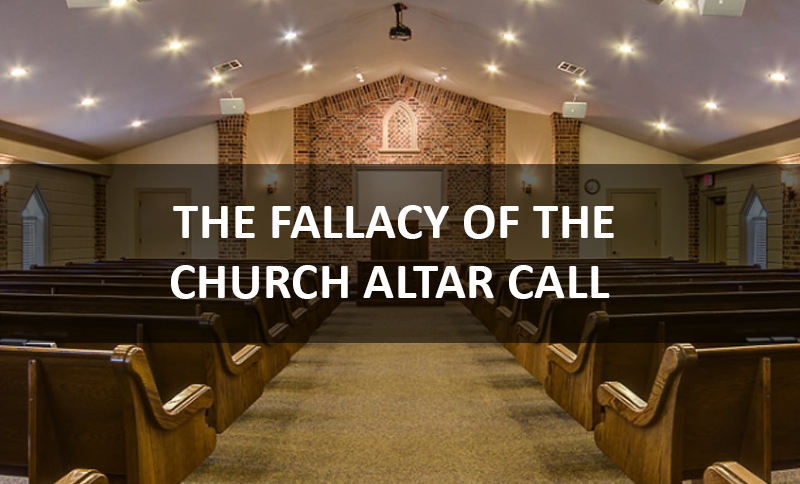Altar calls. Anyone who has gone to church has surely heard it. Near the end of a powerful sermon, or in some churches after every sermon, the pastor will call up the musicians to play ambient Christian music, possibly even a hymn like “At the Cross”. He will then call out for anyone who is not a Christian to get out of their seats and walk down the aisle. Some people will feel pressured, others will be open to the idea. Sometimes, no one will get up.
After an unsaved person boldly steps out in spite of embarrassment and approaches the altar at the front of the church, they will be surrounded by one or more elders or even the pastor himself who will pray with them. After a few minutes of praying and crying and reciting the “sinner’s prayer”, the newly “saved” Christian will feel a weight lifted off them and joyfully go back to their seat. What an experience. Sometimes, perhaps they feel no experience, it is impossible to be sure.
The service is closing and the new “Christian” heads out to their car. Now they are saved! Right? Perhaps during the week, someone from the church will reach out to them to follow up about their newfound “salvation”. They may even reach out more than once.
Now the new “believer” will do their best to attend church every Sunday. They may possibly begin reading the Bible, but maybe not. Perhaps they will begin a prayer life, but maybe not. The real question remains however – has this person truly become a Christian?
Is the altar call Christian really a Christian?

For some people, we have all heard the stories. They were an alcoholic or a cheater or a burglar or into heavy drugs. After their salvation experience, their entire life changed. They stopped drinking or cheating or stealing or using drugs. Their unsaved friends do not recognize them anymore. They transformed from a searching, dark, sinful person to a joyful person with a powerful life change. For these people, we can be certain of one thing: It is evident from their life that they have the Holy Spirit in their heart. Jesus said, “you will know them by their fruits” (Matthew 7:16).
However, how many people really have such a transformative life experience? Those who do not, or perhaps they were already not enslaved to anything major like hard drugs or alcoholism, it could be challenging to know if they are really saved. But should it be?
Many proclaimed Christians after answering the altar call will proceed down the same path they were on before. Or, perhaps after some time of being on good behavior, they will fall right back into their old ways. Maybe they will abstain from drug use for a week, but then get right back into it – often harder than before.
Or maybe if there are none of the major vices, nothing will really change. They will continue in their hidden sins like pornography, or in their harder-to-notice sins like hatred, rebellion, revenge, spite, yelling at their spouse, acting entitled, going on indulgent shopping sprees or overeating, thinking evil thoughts, manipulating people at work, or any other of a host of common modern behaviors that are so often overlooked in the minds of many if not most “Christians” today. Are these people really Christians?
Based on what the Bible says about knowing them by their works or fruits, these people aren’t really Christians. Despite their short-lived emotional “experience” of “salvation” at the altar, being pressured to walk down the aisle to say some words which they really don’t fully understand, nothing changed in their lives. They are the same old selfish, mean-spirited, malicious, conniving sinner as before, and are making little if any effort to change.

Some even long-term “Christians” who have been to church enough to be indoctrinated into Calvinism and Unconditional Grace, are convinced in their minds of the ideas of “once saved, always saved” (like that one time reciting some words really resulted in eternal salvation), and that as long as they vainly “ask for forgiveness” – even if that – then they will be forgiven. They do not believe there is any requirement to change, any requirement to do anything; even some do not even believe they even *have* to ask for forgiveness or repent about ongoing sins, because it is all “covered by the blood of Jesus”. They believe, “the blood of Jesus is enough to cover all my past and future sins no matter what”.
And yet, they are believing a heresy. They have been brainwashed into believing that since they recited some words – and possibly even meant it, at the time – during an alter call, that now they are born-again Christians, immune to any condemnation from the most Holy Father God in heaven. They believe they can go on living their lives, sometimes “trying to be good”, but not because it’s required, they believe. They think that trying to be good is just a good thing to do, but has zero impact on their salvation.
This is not the only problem about the altar call. The modern church has this altar call, which most likely does not result in the permanent salvation of all that walk down that aisle, if any; and not only is this “experience” nearly in vain, but it gives false hope to both the people and to the church. Here, the pastor is given a false confidence that his message has resulted in the permanent salvation of all those who walked down that aisle. Moreover, it gives a false confidence to the ones who walked down that aisle that now they are permanently saved.
The truth, however, is far different. The Pastor may have done nothing but led these victims to their doom. That prayer, without works, is utterly meaningless. To teach that they can achieve eternal salvation by simply saying some words and meaning it is to send many of those people to hell when those words do not give them the salvation they believed they received.
James 2:14-26 addresses just this issue. Faith, when it is not paired with works, is dead. “What does it profit, my brethren, if someone says he has faith but does not have works? Can faith save him?” (James 2:14). “You see then that a man is justified by works, and not by faith only” (James 2:24). “For as the body without the spirit is dead, so faith without works is dead also” (James 2:26).
The “sinner’s prayer” is not enough

You cannot say a prayer once and be done with it. There is no “eternal security” from once believing in Jesus. James elaborates: “You believe that there is one God. You do well. Even the demons believe—and tremble!” If belief alone caused salvation, then even Satan and the demons would be saved, because they believe. Of course, the demons are not saved, because they do not have any works to go along with this belief (along with other factors in their case). “Faith” goes beyond mere belief. Simply saying the words does not save you.
Romans 10:9 says, “If you declare with your mouth, “Jesus is Lord,” and believe in your heart that God raised him from the dead, you will be saved.” However, can you take a single verse alone and ignore the rest of the Bible? Certainly not. This is certainly a prerequisite of salvation, to believe in your heart and declare with your mouth. However, if after doing so you go on to live your life as before, then you cannot be saved, for Hebrews 10:26 says, “For if we go on sinning deliberately after receiving the knowledge of the truth, there no longer remains a sacrifice for sins”.
This blows a hole in “eternal security”. If you are to say that answering the altar call resulted in permanent salvation no matter what, then you would have to deny Hebrews 10:26, as well as even Jesus’ own words, “He cuts off every branch in me that bears no fruit, while every branch that does bear fruit he prunes so that it will be even more fruitful” (John 15:2).
Jesus Himself told us that He will cut off those so-called “Christians” who bear no fruit. Who by their works, their malicious, useless, selfishness devoid of all fruits toward others, have by their actions declared themselves enemies of God. James 4:4 says, “You adulterous people, don’t you know that friendship with the world means enmity against God? Therefore, anyone who chooses to be a friend of the world becomes an enemy of God.” Jesus said that He will cut off these enemies of God who tried to call themselves “Christians”.
Romans 11:24 says, “After all, if you were cut out of an olive tree that is wild by nature, and contrary to nature were grafted into a cultivated olive tree, how much more readily will these, the natural branches, be grafted into their own olive tree!” Paul was saying that as you when you chose to be part of the family of God were grafted onto the “tree”, that is, into the family of God, likewise if by your works you fail to provide fruit and continue in your sinful, even subtly sinful ways, then you will be removed from the family of God (the olive tree) to make way for others who will show their devotion to God through their actions, not just their words.
The altar call fallacy

The altar call is a fallacy because not only does it fail to present the reality of salvation, that it is not merely some one-time experience at the end of a church service but a lifelong servitude to God; but additionally the church has failed to provide an adequate environment for a person who wants to be a part of the family of God. If the church is to take on the responsibility of bringing new Christians to God, its mission does not end at the altar. However, tragically, most churches feel their mission is complete when that person walks down the aisle.
You cannot simply “become a Christian” by simply saying some words and hope that God forces you to be good from now on. Ask any Christian if they ever sinned after answering the altar call. If they said they never sinned again, they are lying. Obviously, God does not force a person to be perfect from the moment they say those words. It is still up to that person. If God forced everyone who said the “sinner’s prayer” to be perfect, this world would be a drastically different place. God does not take away our free will to choose to sin just because we recited some words and possibly even believed them. God allows us our free will until the day we die.
Therefore, being part of the family of God is a lifelong commitment. it is not easy, it is grueling and extremely difficult. You must sacrifice those things you want most in this world for the sake of God. Holding an altar call under the illusion that now these people will enter into an eternal security of salvation after reciting those words, is dreadfully evil, because it undermines the entire message of Jesus.
Jesus’ message was not to merely to believe in Him. Did Jesus ever sit down with his disciples to say a sinner’s prayer with them and say, “now you’re saved, go on your merry way”? No, Jesus told them to drop everything they had and follow Him. He told them to leave their jobs, their family, their entire life and start a new life following after Jesus full-time.
The disciple who wasn’t: The rich young ruler

There was almost another disciple. When Jesus encountered a rich young ruler who claimed to have kept all the commandments his entire life, and asked Jesus how to be saved, did Jesus say, “just believe in your heart, now you are saved forever”? Absolutely not. Here is what Jesus really said, “And Jesus, looking at him, loved him, and said to him, “You lack one thing: go, sell all that you have and give to the poor, and you will have treasure in heaven; and come, follow me”“ (Mark 10:21).
Jesus required that the man not only live a life free from sin, but also to give up all that he had and follow Jesus. This is the answer that Jesus gave when asked directly how to attain salvation. Nothing has changed since then. We must drop everything to follow Jesus, or else we cannot achieve salvation. Fortunately, Jesus offers a promise:
“Truly I tell you”, said Jesus, “no one who has left home or brothers or sisters or mother or father or children or fields for My sake and for the gospel 30 will fail to receive a hundredfold in the present age—houses and brothers and sisters and mothers and children and fields, along with persecutions—and to receive eternal life in the age to come” (Mark 10:29-30).
In order to attain salvation, we must leave everything on this Earth to follow after Jesus with all your heart. If we do not experience a radical heart change, it can be evident there is no working of the Holy Spirit in our lives. If the Holy Spirit is not working in your life, then you can be certain you are not saved. You still have a chance, I believe you have a chance until the day you die, but in order to be saved, your faith absolutely must be evident in your works. If you bear no fruit, those words you spoke once are not enough to save you.
The altar call experience does not alone provide salvation

Going to the altar once is not going to give you salvation. Going to the altar several times also will make no difference. While the altar call during a church service may present a powerful opportunity for someone to accept God, walking down that altar does not mean salvation. The only way to attain eternal security is to every day for the rest of your life to lay your own life down at the altar of Jesus and recommit your life to Jesus each and every day. To leave everything you have to follow Jesus. To give up all that you want and all that you desire for the sake of God. God will most certainly reward you, but it is not going to be easy for as long as you live in this world.
If Christians do not wake up and recognize that that emotional experience during an altar call at church does not necessarily indicate salvation, then many Christians may be headed to hell in blissful ignorance. The Bible tells us the truth:
22 Many will say to Me on that day, ‘Lord, Lord, did we not prophesy in Your name, and in Your name drive out demons and perform many miracles?’
23 Then I will tell them plainly, ‘I never knew you; depart from Me, you workers of lawlessness.’” (Matthew 7:22)
According to Jesus’ own words, if you do not do the will of God in heaven, you are not saved, and on the day of judgment you will be cast out. Do not let that be you!



